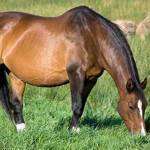Body Condition Affects Mare Reproduction

Body condition of mares can affect reproductive efficiency. For optimal efficiency, mares should be maintained at a body condition score of at least 5 but preferably 5.5 or 6. According to Henneke’s nine-point body condition scale in which 1 is emaciated and 9 is obese, a 5 represents moderate body weight. The back is level with no crease or ridge, ribs cannot be seen but can be felt, tailhead is surrounded by a layer of fat, withers are well-rounded, and neck blends smoothly into the shoulder.
Research has shown that barren mares kept at a body condition score of 5 begin ovulating sooner than mares with body condition scores less than 5. These mares also require fewer estrus cycles to achieve pregnancy and generally have higher conception rates.
Mares that enter the breeding season thin, regardless of whether or not they are being fed sufficient energy to gain weight, are less reproductively efficient than those in moderate body condition.
On the opposite end of the weight spectrum, moderately fat or obese mares were just as reproductively efficient as their average-sized peers. Interestingly, some overweight open mares, maintained at body condition scores between 6.5 and 8, continue to cycle throughout the winter months, usually a period of ovarian inactivity.
Mare owners should take note that obesity can take its toll in other facets of broodmare management. Mares retired to the broodmare band for chronic unsoundness might fare better when they are kept in slimmer condition, especially during the last months of pregnancy when the burden of the fetus is greatest. Obesity-related metabolic problems plague broodmares as often as they affect other horses, so weight management is important to the health of mares.
Group-feeding situations sometimes preclude timid mares from getting their fair share from the feed bunk. Observation of the herd will reveal if there is peace or upheaval among your mares during feedings. If you notice one or more mares are determined bullies, it might be best to separate the less aggressive mares from the others. This will ensure thin mares are getting sufficient feed to increase body condition. If a thin mare does not gain weight despite being fed apart from her herdmates, you might look into other causes such as parasitism, dental problems, or pain issues. An experienced equine nutritionist and your veterinarian should be consulted if a thin mare fails to gain weight.








